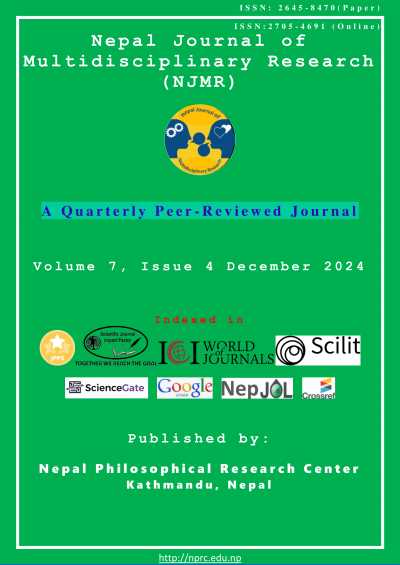Post-Merger Challenges and Their Impact on Customer Satisfaction
DOI:
https://doi.org/10.3126/njmr.v7i4.73970Keywords:
Customer satisfaction, service quality, trust, accessibility, banking mergerAbstract
Background: The global banking sector, including Nepal, has witnessed significant mergers and acquisitions (M&As) to enhance competitiveness and operational efficiency. These strategic moves, while beneficial for financial stability, often disrupt customer satisfaction, particularly in aspects like service quality, trust, and accessibility. The merger of GBIME Bank and NABIL Bank offers a unique opportunity to explore these dynamics.
Methods: A quantitative research design was employed, utilizing a structured survey of 300 customers stratified by banking channels. Key variables examined included service quality, trust, accessibility, and customer satisfaction. Regression and correlation analyses tested the relationships between these variables.
Results: Findings reveal that service quality (β = 0.42) and trust (β = 0.48) positively influence customer satisfaction, while accessibility challenges (β = -0.20) negatively impact it. High service quality and trust were maintained post-merger, fostering customer loyalty. However, accessibility issues, particularly in rural areas and digital banking platforms, emerged as significant concerns.
Conclusion: The study underscores the importance of maintaining service quality and trust while addressing accessibility challenges during banking mergers. The findings provide actionable insights for enhancing customer satisfaction and managing post-merger transitions effectively.
Novelty: This research uniquely emphasizes accessibility’s dual role—physical and digital—in customer satisfaction, offering targeted strategies for mitigating disruptions during mergers. It extends existing literature by addressing the specific dynamics of Nepal's banking sector.
Downloads
Downloads
Published
How to Cite
Issue
Section
License
Copyright (c) 2024 The Author(s)

This work is licensed under a Creative Commons Attribution-NonCommercial 4.0 International License.
This license enables reusers to distribute, remix, adapt, and build upon the material in any medium or format for noncommercial purposes only, and only so long as attribution is given to the creator.




